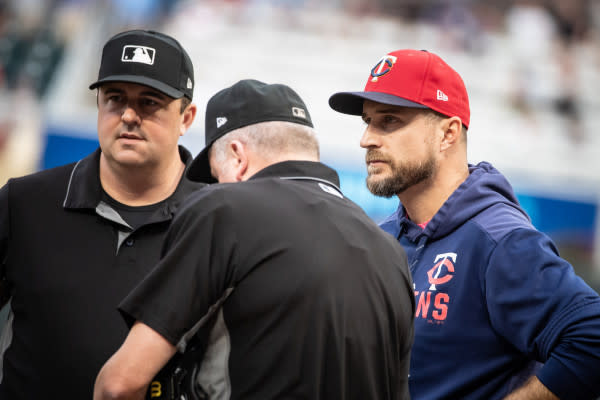
After watching a season with 101 wins go to waste in another first-round playoff exit, Twins fans were expecting a complete overhaul to their starting rotation this winter. Through the first couple of weeks, this fanbase has been utterly disappointed.
Gerrit Cole and Stephen Strasburg predictably took big-money contracts in New York and D.C., respectively, and other free agents such as Zack Wheeler decided to head somewhere else.
Even as the Twins court impact free agents like Hyun-Jin Ryu and Dallas Keuchel, there’s a sense that they too might rather go somewhere else than play in the frozen tundra of Minnesota, even though the summers here are glorious.
With no signings imminent and rumors of trading Eddie Rosario to fill the voids in the rotation, Twins fans are getting antsy as even lower-tier free agents like Rick Porcello and Tanner Roark have come off the board much earlier than free agents did a year ago.
So why doesn’t anybody want to come to Minnesota and join a team that is apparently on the rise from a breakout 2019? Do they just not find the Twin Cities to be an attractive destination? Is it the cold early season games? Do their families prefer other locations? Is it the tax rate?
Whatever it is, Twins Twitter still believes that ownership isn’t willing to throw a blank check at a top free agent and do whatever it takes to get them to Target Field.
“Taking a step back financially to take a step forward makes sense here.”
But there is one thing about this offseason that gives me foolish hope even if the free-agent market is drying up. It’s that Jim Pohlad would be an awful businessman if he’s putting salary restrictions on Chief Baseball Officer Derek Falvey and General Manager Thad Levine.
Take a look at the 2019 season. Coming into the year, the feeling of Twins fans was reminiscent of the opening scene of Major League. With the Twins not looking too freaking good, it took a historic binge of home runs and a blazing fast start to have the fans who got sick of watching Mike Pelfrey struggle through five innings dig out their Doug Mientkiewicz jerseys and show up at Target Field.
With the first non-home opener sellouts at Target Field in nearly five years, Mr. Pohlad probably had more loads of coin delivered to his Scrooge McDuck swimming vault and thus made way more than the $269 million the Twins made in revenue in 2018, per Statista.
In that sense, Pohlad would be a terrific businessman if he told Falvey and Levine not to spend money to improve the biggest flaw on the Twins, but he’d also be leaving meat on the bone.
Let’s use the Twins’ pursuit of Wheeler as an example.
According to the Star Tribune’s La Velle E. Neal, the Twins offered Wheeler a five-year, $100 million contract to come to Minnesota. That deal would have nearly doubled the franchise record for a free-agent signing as Ervin Santana inked a four-year, $54 million contract in the winter of 2014, and Dan Hayes of The Athletic noted that the Twins were willing to increase Wheeler’s offer.
So, what if the Twins did sign Wheeler for the five years and $118 million he got from the Philadelphia Phillies? Yes, Pohlad would be losing money on the initial investment, but it would improve the team, making him more money in the long run. Taking a step back financially to take a step forward makes sense here.
Not being able to see the long-term view would be amazingly stupid, which should make many wonder if ownership is actually the problem.
Instead, they could look to Falvey and Levine, who seem like the type of guys who would be a nightmare in a Wendy’s drive-thru.
Falvey: Yes, I’ll have the double stack please.
Wendy’s: Would you like the value meal?
Falvey: Well, you see…that’s a good question…and it’s complicated. It’s tough to tell what true value is in this market these days. There’s a lot of numbers and analy…
Wendy’s: Sir, this is a Wendy’s. Do you want the value meal or not??
Although it doesn’t fit the talk radio narrative, Falvey and Levine have an excellent track record of finding bargains. For example, last year the Twins went into the free-agent market and added C.J. Cron off waivers ($4.8 million), Nelson Cruz ($14 million), Jonathan Schoop ($7.5 million) and Martin Perez ($3.5 million).
That’s $29.8 million for a group of players, most of whom, who played significant roles in helping the Twins win 101 games.
At its core, the idea of finding value in free agency while spending money to lock up homegrown stars like Jorge Polanco and Max Kepler (who received $60.75 million in extensions last spring) makes plenty of sense.
And just because a team can spend north of $100 million on Yu Darvish doesn’t mean they should do it. Just ask the Cubs, who gave Darvish a monster deal last winter only to see him surrender a league-worst 33 home runs while looking like a shell of himself the entire first half of the season. The Cubs missed the playoffs, by the way.
That’s one example of a big-money deal not working out immediately. It still could for the Cubs, and refusing to give five-year deals to aging stars like Madison Bumgarner is perhaps a reason why plenty of talented pitchers are slipping away as the Twins look like that Fresh Prince of Bel Air GIF.
In short, something is happening that the Twins can’t lure anyone to Minnesota. Either players don’t want to come here, the front office is being too picky or the owner doesn’t want to spend.
The narrative can change immediately if the Twins land Ryu, Keuchel or third baseman Josh Donaldson, but if the Twins once again upgrade internally and through the bargain bin only to get waxed in the playoffs, the narrative remains the same and fan frustration will continue to grow.





